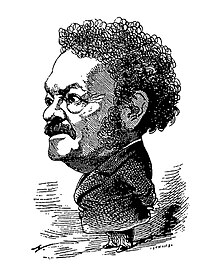| Les martyrs | |
|---|---|
| Grand opera by Gaetano Donizetti | |
 Gilbert Duprez, who sang the title role in the posthumous premiere | |
| Librettist | Eugène Scribe |
| Language | French |
| Based on | Corneille's Polyeucte |
| Premiere | 10 April 1840 |
Les martyrs (The Martyrs) is a four-act grand opera by Gaetano Donizetti set to a French libretto by Eugène Scribe. The libretto was based on one written by Salvadore Cammarano for an original Italian version known as Poliuto, which was not performed until after the composer's death. Pierre Corneille's play Polyeucte written in 1641–42, the story of which reflected the life of the early Christian martyr Saint Polyeuctus, is the original source for both versions.[1]
When Poliuto was banned by the King of Naples just before it was due to be performed in 1838,[2] Donizetti became angry at this decision and, with a commission from the Paris Opéra due, he paid the penalty to the San Carlo for not producing an original work as a substitute, and left Naples for Paris arriving on 21 October.[3]
As his first of two commissions for the Opéra, he proposed to revise Poliuto and, between 1839 and 1840, a French text was prepared by the noted French librettist and dramatist, Eugène Scribe, which conformed to the conventions of French grand opera but which incorporated 80% of the music from Poliuto.[2] Revised to suit the taste of the Paris opera-going public and with the title changed to Les martyrs, the opera was presented on 10 April 1840.
When eventually given in Italy, Les martyrs was initially presented in a translation from the French version under several titles including I martiri. It took until 30 November 1848, months after the composer's death, in order for Poliuto to finally appear at the San Carlo in its original Italian three-act version,[4] the one which is most frequently performed today.
It is regarded by one writer as Donizetti's "most personal opera" with the music being "some of the finest Donizetti was to compose".[5]